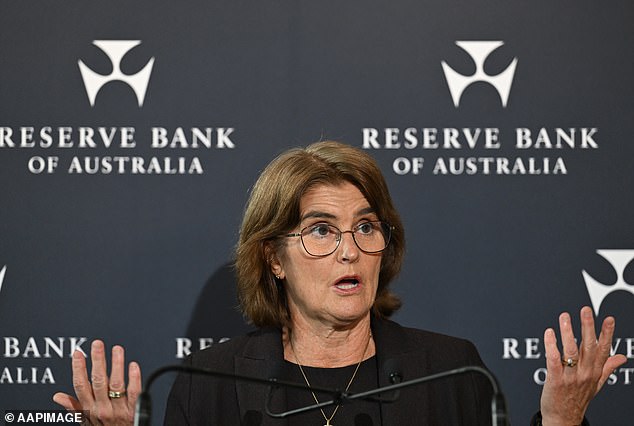Australia’s most powerful banker Reserve Bank Governor Michele Bullock has been trying to scare you – but Westpac’s chief economist Luci Ellis claims it’s all bluff
A former Reserve Bank insider has alleged that her former employer is waging a scare campaign over inflation.
Reserve Bank Governor Michele Bullock confirmed last month that her board was considering a rate hike, but not a rate cut. The cash rate remained unchanged at a 12-year high of 4.35 percent.
The word ‘inflation’ was also mentioned 24 times in the accompanying statement and 60 per cent of consumers surveyed by Westpac this month expect another rate hike.
Fears of a rate hike have grown after new figures showed inflation rose slightly to 4 percent in the year to May, still above the RBA’s target of 2-3 percent.
But Luci Ellis, chief economist at Westpac and a former RBA assistant governor who spent 30 years at the Reserve Bank, says Australia is more likely to do the same after the European Central Bank cut interest rates last month.
“The Reserve Bank’s board will also take into account that other central banks have already started cutting interest rates or are actively considering doing so soon,” she said in a video on Friday.
‘They no longer have to toe the line with their colleagues overseas, but the experiences of other central banks provide a guide to how things might develop in Australia.
“We saw a general global inflation shock and so they will take the lessons from other countries to heart when thinking about how quickly inflation might come down.”
A former Reserve Bank insider has hinted that her former employer is running a scare campaign over inflation (Luci Ellis is pictured left with former governor Philip Lowe)
Dr Ellis, who could have become Reserve Bank governor had she stayed at the RBA, expects interest rates to remain unchanged at the next meeting in August.
“We should never say never, and if inflation does end up being higher than we expect, it is possible that the Reserve Bank Board may feel that it needs to intervene. But that is not our core view,” she said.
The second-quarter inflation figures, due to be released on July 31, could increase the likelihood of a rate cut in 2024 if the consumer price index falls below the 3.6 percent level in the third quarter.
“Inflation is too high, but it is falling. If inflation plays out roughly as we expect, in the June quarter, that means it is generally falling at the rate that the Reserve Bank hopes,” Dr Ellis said.
‘Such an outcome would prompt the Reserve Bank to leave interest rates unchanged in the short term, before eventually cutting rates once inflation approaches the 2 to 3 per cent target.
“You can never predict the future perfectly, but we think this is the most likely outcome.”
Westpac and the Commonwealth Bank are both expecting a rate cut in November, which would be the first easing since November 2020 during Covid.
But the NAB has revised its forecasts to expect the first rate cut to come in May, rather than November, postponing the easing of the more aggressive hikes since the late 1980s.

Reserve Bank Governor Michele Bullock confirmed last month that her board was considering a rate hike but not a rate cut as it left the cash rate unchanged at a 12-year high of 4.35 percent.
ANZ last month updated its forecast for a rate cut in February.
Ms Bullock confirmed in June that a rate hike was being discussed, but not a rate cut.
“Yes, the board discussed raising interest rates at this meeting,” she told reporters.
“No, no budget cuts have been taken into account,” she said.
The Westpac-Melbourne Institute consumer confidence survey in July found that 60 percent of the 1,200 respondents expected another rate hike, suggesting the RBA’s inflation warnings are having some effect.
Ms Bullock did not mention the word “inflation” once at the Pacific Banking Forum dinner in Brisbane this week, but she has previously spoken about managing consumers’ inflation expectations so they spend less.
